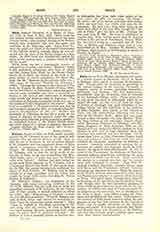

Baini, ABBATE GIUSEPPE, b. in Rome, October 21, 1775; d. there May 21, 1844. Baini made his first musical studies under the direction of his uncle Lorenzo Baini, a distinguished disciple of the Roman School, who introduced him into the spirit and traditions of the Palestrina style. Later Baini became the pupil and friend of Jannaconi, choirmaster of the Vatican Basilica, through whom he was admitted into the choir of the Sistine Chapel as a bass singer. In 1818 Baini was unanimously elected director of the famous choir, a position which he held till his death.
While Baini has left a considerable number of compositions (notably a ten-voiced “Miserere” which is still performed, alternately with those of Allegri and Bai, during Holy Week, by the Sistine Chapel choir), all of which are written in the style of the great period of classic polyphony, his great life-work was his “Memorie storico-critiche della vita e delle opere di Giovanni Pierluigi da Palestrina” (1828). Through the translation into German of this work by Francis de Sales Kandler (Vienna, 1834), the life and labors of Palestrina’s school and period became more accessible and were a powerful influence in the revival and restoration of liturgical music which was about to take its beginning. The publication of Palestrina’s complete works was one of the results of Baini’s biography of the master. Baini lived so completely in the great musical past that he had but scant sympathy with, or understanding for, modern developments of the art. Besides the biography of Palestrina he has left a study on the theory of rhythm of the ancients under the title: “Saggio sopra l’identita di ritmi musicali e poetici”; an unfinished history of the Sistine Chapel choir; and other essays of a critical or theoretic character.
JOSEPH OTTEN

